January 3rd, 2016 — 7:29pm
One Plus One By Jojo Moyes
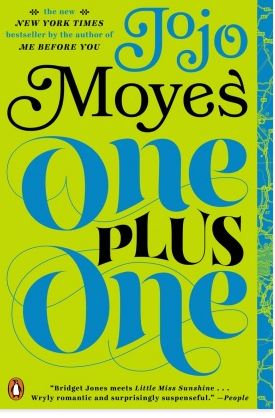 This is a road story about three plus one unlikely characters. There is Jess, a 20-something single mom, her maybe 12-year-old daughter, Tanzie and her teenage misfit stepson who was recently bullied. The plus one is Ed, a mid-30’s guy who Jess met when she cleaned his house in her job as a house cleaner and also drove him home one evening from the pub, where she works in the evening, after he drank too much. Tanzie is a math wizard who has the opportunity to win a scholarship plus expenses if she does well in the Math Olympiad in Scotland (They all live in England). Ed who is usually called Mr. Nicholls offers to drive Jess and family to Scotland after he sees them on the road when their car broke down on the way there. There is also a large droopy dog, Norman, who is along on this road trip so it is really three plus one plus one.
This is a road story about three plus one unlikely characters. There is Jess, a 20-something single mom, her maybe 12-year-old daughter, Tanzie and her teenage misfit stepson who was recently bullied. The plus one is Ed, a mid-30’s guy who Jess met when she cleaned his house in her job as a house cleaner and also drove him home one evening from the pub, where she works in the evening, after he drank too much. Tanzie is a math wizard who has the opportunity to win a scholarship plus expenses if she does well in the Math Olympiad in Scotland (They all live in England). Ed who is usually called Mr. Nicholls offers to drive Jess and family to Scotland after he sees them on the road when their car broke down on the way there. There is also a large droopy dog, Norman, who is along on this road trip so it is really three plus one plus one.
Jojo Moyes has a writing style that holds our attention with details of an interesting backstory about each person, which also shows their unique personality. We get insight into how the characters were developed. It turns out that they are all troubled. Jess and the kids all had difficult childhood experiences. Ed, while successful in business now has to deal with a recent personal relationship, which threatens to drastically change his life. They are all in the car, driving only 45 miles an hour on their way to Scotland because Tanzie gets sick when the car goes over that speed. As they putter along, their feelings unravel to the reader.
I believe that the magnetism that draws us to this book and makes you not want to put it down is that there always seems to be a glimmer of hope for each of them individually, as well as a group. But as exciting and hopeful as the story swings for them, there are circumstances, which challenge or devastate that hope. There is the wish for a fairytale ending but yet, it is a book about real life.
There is also great potential for this book as a movie with outstanding roles for in-depth character portrayals, which could even include some R-rated scenes. There is passion, love, poignancy, moral and ethical dilemmas. There is even an important role for a dog. But don’t wait for the movie, this will be a great read.
Comment » | FG - Fiction General
July 21st, 2015 — 1:00pm
The Rent Collector by Camron Wright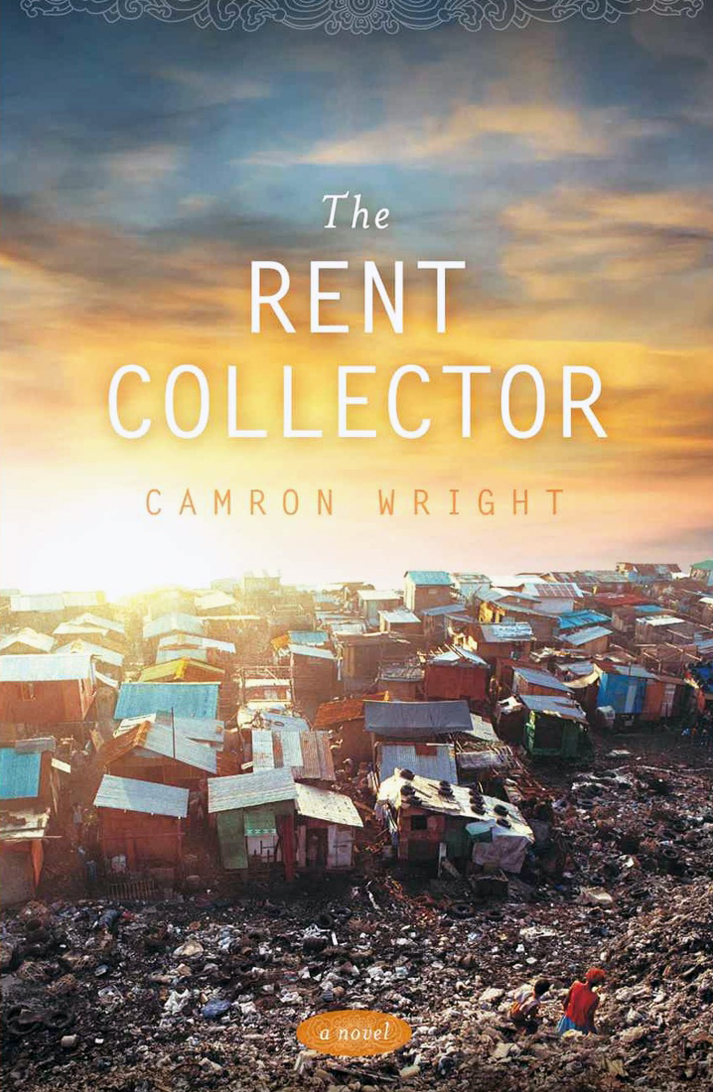
In the past year, I have read various novels about countries, cultures and life experiences that were immensely different than anything that I knew about. This included the fate of orphan children who were shipped throughout the United States, the plight of Mexican immigrants in this country, the difficulties that the Jews and France experienced during World War II, the bizarre life of living in North Korea, the American-Indians living in this country during the 17th century. This novel presented still another perspective of which I was unfamiliar and did not fully appreciate. That is living on a gigantic garbage dump in modern day Cambodia where a person might live with his family in a shack with a tarp as a doorway and no electricity. On top of that, the families would eek out a bare subsistence by picking through the smoldering garbage piles to find any items that they could sell for a small amount of money to buy food which was mostly rice, so their families could survive until the next day. While the details of the story were fiction, the characters in the book were real and there were actual photographs of them at the end of the book.
Yet the novel was much more than a revelation of how some people might live today in Cambodia or the historical and political circumstances behind this travesty. Camron Wright has told a story that reflects the potential humanity that can exist in any life circumstances. He focuses on the tradition for literature to convey meaning, love and hope throughout the ages in a multitude of cultures.
One of the main characters in the book is the story teller of this novel, Sang Ly. We meet her as a married woman with a small sick child who was trying to survive in this horrendous environment. The other main character is Sopeap Sin or the rent collector, a seemingly mean old woman who collects the rent from these poor people who live in the immediate area surrounding this gigantic garbage dump. We learned that she has a poignant and complicated history. Among the many facets of her background is that she has great knowledge of literature. She accepts Sang Ly’s invitation to teach her to read and the plot takes off from there. On one hand, this is a simple beautiful story and yet on the other hand, it is as complicated as the hidden meaning of great literature and the secrets of our dreams deep in our hearts.
Comment » | FG - Fiction General
June 15th, 2015 — 12:14am
Review of Out of My Mind by Sharon Draper
Guest review written by Leo age 11 1/2
Out of My Mind is about an 11-year-old girl named Melody who has Cerebral palsy.
“I can’t walk. I can’t talk. I can’t feed myself or take myself to the bathroom. Big bummer,” she tells us on page 1. Because Melody can’t speak, many people assume she isn’t smart. In fact, Melody’s brain works like anyone else’s. She is exceptionally smart, clever and a trivia expert.
At school, Melody is in a special education class, where she doesn’t learn much most years. Then, the school starts an inclusion program where all the kids in Melody’s class get to participate in a “normal” class once in awhile. Melody is really excited about this, but when the class starts, a couple of kids aren’t very nice to her, and some of the others ignore her. But one girl named Rose sits next to Melody, and they become friends. Melody likes having a friend, yet sometimes she still feels left out. The inclusion program is a little frustrating for Melody because when she knows the answer to a question (which is a lot of the time) she can’t say it. Through all the challenges Melody is still glad to be part of it because she gets to learn so much more than she did before.
The rest of the book shows how Melody sees the world. It shows the relationship between Melody and her parents and family. Also, the book shows how Melody’s next-door-neighbor, Mrs. V. pushes Melody to do the “unspeakable.”Out of My Mind talks about the many stereotypes and assumptions people make about someone who has Cerebral palsy.
I definitely recommend this book if you want to read something completely different. It really shows the way someone who has a disability or many challenges feels, and how they conquer those challengesOut of My Mind is like no other book I’ve read; it makes me realize that there are so many things in life that are far more complicated than we think,
Out of My Mind is the winner of the 2015 Wildwood Medal
Comment » | C - Recommended for Children, FG - Fiction General
May 23rd, 2015 — 9:58pm
The Rosie Project by Graeme Simsion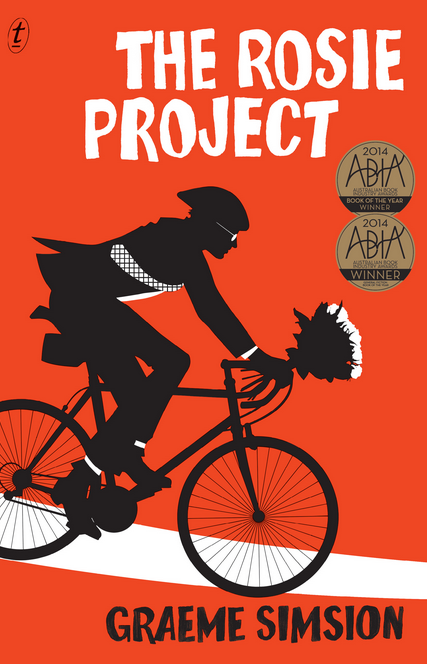
Dr. Don Tillman is a professor of genetics in Australia where the book is set. It is his voice that tells the story. It does not take long to realize that it is probably the voice of a person with Asperger’s Syndrome. Don, while obviously quite brilliant, lacks the ability to socialize and empathize with other people. At least so it seems. His only real friends are Gene, a faculty member in the Psychology Department and his wife, Claudia, who is a clinical psychologist. They have an open marriage as Gene attempts to have sex with a wide variety of women from all over the world (putting pins in a map marking each conquest). Gene and Claudia are loyal friends of Don and do their best to advise him how to get along with people.
Don undertakes two projects, which allows the reader to learn about how he thinks as well as getting some insight into human nature. The first is The Wife Project. For this, Don makes a questionnaire of all the characteristics he believes he would want in a wife. With the help of Gene, he is able to distribute this questionnaire to a wide variety of women. Factors that are evaluated are things such as smoking, drinking, eating habits, body mass index (BMI) and many others. No one really measures up to score very high in this questionnaire in Don’s quest to meet his life partner. Don does meet Rosie through Gene, who although she does not meet the criteria set out in the questionnaire but with whom he does develop a friendly relationship. Rosie was initially believed by Don to be a bartender but turns out to be a PhD student working in a bar to earn extra money.
It is with Rosie that he develops a second project known as The Father’s Project. It seems that Rosie was unhappy with the man who was known to be her stepfather because he did not deliver on his promises including a childhood hope to go to Disneyland. Her mother died when Rosie was a young girl and things that her mother told her before she died gave her reason to believe that her biological father was actually someone in her mother’s medical school graduating class and had impregnated her at the time of a reunion celebration. There was a picture of all the attendees at this celebration and Rosie and Don embarked upon The Father’s Project where they attempted to track down all these men and surreptitiously obtain samples for DNA analysis, which Don as a genetics professor could do in his laboratory.
Readers of this book blog as well as my psychiatry blog and movie blog would have noted that I have written about the not so uncommon quest to connect with an unknown biological relative, after many years and sometimes a lifetime of no contact with them and no knowledge who that person may be. ( see psychiatry blog about this subject ) This theme also shows up in movies ( see movie blog about this subject which will links to several movies ) and books as well as this one and in clinical cases as illustrated in my psychiatry blog. As Don and Rosie team up with The Father’s Project, we appreciate how Don intensifies an interest with Rosie. He begins to question many of his assumptions about relationships and his own feeling.
No matter how well a person may fit, the diagnostic criteria for an entity whether it be a narcissistic personality, bipolar disorder, major depression, Asperger’s syndrome or any other entity, there are human qualities that affect the ability for everyone to care for another person, fall in love and have an ability to change. This interesting delightful and enlightening story clearly makes this point.
I understand there is a sequel book by this author, titled The Rosie Effect as well as a movie currently being made. If you like this book as I did, you probably will want to check these out.
1 comment » | FG - Fiction General, FR - Fiction Romance
April 10th, 2015 — 12:55pm
The Harder They Come by T.C. Boyle
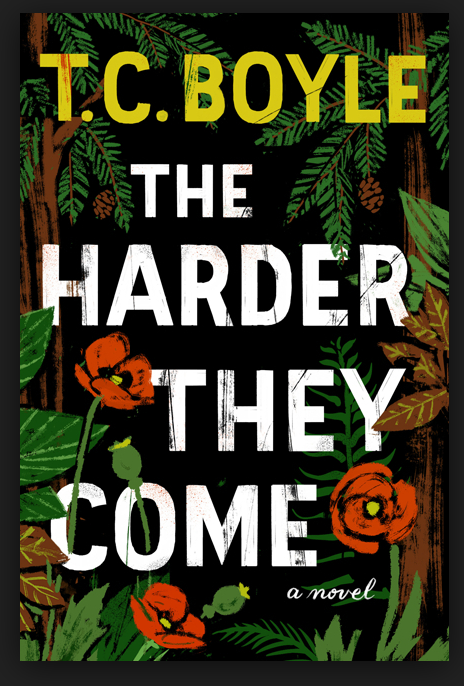
In this novel by T.C. Boyle, we are presented with a handful of people who fall on a spectrum in regard to their feelings about the United States. They are the hardworking guys who feel that the Mexicans among them are up to no good and are probably drug dealers who should be arrested. They are also people represented by one woman who feels that the US Government has made life too restrictive and that they shouldn’t be required to register their cars, get a driver’s license, and follow other laws which they believe abridge their rights. Then there was one character who has gone renegade and acts as if he still is one of the early American settlers who is battling various Indian tribes and feels that everyone is against him. This character is clearly psychotic and has lost touch with reality. Perhaps this is the point that the author is trying to make about such political views. He seems to be saying that any extreme repudiation of our form of government is “crazy” and unrealistic.
Boyle’s writing style in this book matches his hard-assed defiant view that is presented in it. It sounds like John Wayne at his toughest, continually talking and narrating a book. It begins to feel unrealistic as nobody we know talks in this tone all the time.
The only other book which I read by this prolific author was Tortilla Curtain. In that book, he conveyed an empathetic, understanding of the undocumented Mexicans who had come across the border into California as well as the other Californians who were trying to respond to them. In this more recent book, it was more difficult to identify with the “oppressed citizens” who felt that their rights were being taken away from them. The writing style mentioned above while intense and engaging made this reader feel that he was up against a dangerous enemy which was an uncomfortable experience. It may be that that was the point of this book.
There is another dynamic here that is really quite powerful and poignant. That is the relationship between Adam, the psychotic young man who runs amuck, and his father Sten who had been a Vietnam marine. Early in the book, we see an incident where Sten and his wife are on a tour in Costa Rica where there are threatened by some thugs with a gun and a knife who want to rob them. Sten grabs one of the would-be attackers from behind and kills him in a chokehold as the others flee. This becomes a salient moment for Sten as he has to deal with the adulation he gets from the public as well his own guilt feelings. This incident also provides the readers with an insight into his mind and the struggle that he has within himself as he sees his own son developed into a dangerous threat to society. The murderous rage behavior that we see periodically in the newspapers (i.e. the suicidal pilot who brought down a plane load of innocent people) is reminiscent of these kind of feelings. How often do we contemplate the dynamics of the family of that man and the struggle that the parents must have in coming to grips with this child’s action. Boyle hits us with such insights as the beat of his writing reverberates in our minds.
Comment » | FG - Fiction General
January 20th, 2015 — 10:30am
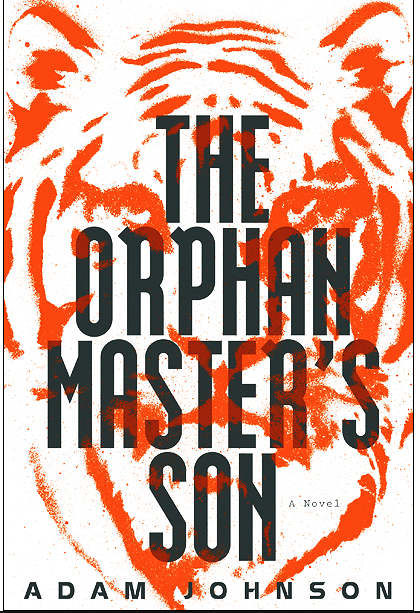 The Orphan Master’s Son by Adam Johnson- This book reminded me of the many science fiction stories I read as a teenager. To me it felt as if we were learning about life on an alien planet. In this society, there is no kind of a stable life style or comfortable relationships. People can be whisked away, to do some work detail, sometimes never to return. If a wife has her husband taken away she might be assigned a substitute husband. On this planet children’s values come from loudspeakers that tell fables or bizarre truth or near truth all the time. Since there is no pretense that this is life on another planet, the reader might try to put it in prospective of something we have known about. Is this a version of the Holocaust where one group of people were completely devalued and then attempts made to ship them off and kill them all? However, here there isn’t one group of people that is subject to annihilation, it can be just about anyone. “ 1984” and Big Brother come to mind but we don’t have to think about a futuristic society because we are already told we are talking about North Korea and the way its rulers or should I say “Ruler” controls everyone’s life. In fact one of the central characters is Kim Jon II,, himself (referred to as “ Dear Leader”), the recently deceased leader of that country who is the father of the actual leader today Kim Jung Un. So if we take the story at face value are we being told the behind the scenes horrible life of the people who live in North Korea? Apparently the truth is that it is very difficult to be confident about what goes on in North Korea today. Adam Johnson, the author has visited the country and tried to speak with people who live there but who usually won’t speak to outsiders. He has told of interviews that he has had with defectors who have come over to “our side.” Johnson himself in interviews has admitted that much of the horrors in his book , he has made up although founded, no doubt ,on the stories he has read and things he has seen. Living in captivity, without descent food, eating flowers, having no toilet, being tortured by the “ autopilot “and ultimately becoming inhuman is apparently not an unusual story. The book is written well and the shifts in time and person as one character inhabits another character are challenging to follow but does help to take us to a deeper reveal of this horrible society that we are being told about. I have tried to understand the awarding of the Pulitzer Prize for this book and perhaps it was for the unique journey that the author chose to take us on. All the details can’t be accurate but the depiction probably is and thus Mr. Johnson has moved the curtain to show us one of the truly tyrannical societies that exists today.
The Orphan Master’s Son by Adam Johnson- This book reminded me of the many science fiction stories I read as a teenager. To me it felt as if we were learning about life on an alien planet. In this society, there is no kind of a stable life style or comfortable relationships. People can be whisked away, to do some work detail, sometimes never to return. If a wife has her husband taken away she might be assigned a substitute husband. On this planet children’s values come from loudspeakers that tell fables or bizarre truth or near truth all the time. Since there is no pretense that this is life on another planet, the reader might try to put it in prospective of something we have known about. Is this a version of the Holocaust where one group of people were completely devalued and then attempts made to ship them off and kill them all? However, here there isn’t one group of people that is subject to annihilation, it can be just about anyone. “ 1984” and Big Brother come to mind but we don’t have to think about a futuristic society because we are already told we are talking about North Korea and the way its rulers or should I say “Ruler” controls everyone’s life. In fact one of the central characters is Kim Jon II,, himself (referred to as “ Dear Leader”), the recently deceased leader of that country who is the father of the actual leader today Kim Jung Un. So if we take the story at face value are we being told the behind the scenes horrible life of the people who live in North Korea? Apparently the truth is that it is very difficult to be confident about what goes on in North Korea today. Adam Johnson, the author has visited the country and tried to speak with people who live there but who usually won’t speak to outsiders. He has told of interviews that he has had with defectors who have come over to “our side.” Johnson himself in interviews has admitted that much of the horrors in his book , he has made up although founded, no doubt ,on the stories he has read and things he has seen. Living in captivity, without descent food, eating flowers, having no toilet, being tortured by the “ autopilot “and ultimately becoming inhuman is apparently not an unusual story. The book is written well and the shifts in time and person as one character inhabits another character are challenging to follow but does help to take us to a deeper reveal of this horrible society that we are being told about. I have tried to understand the awarding of the Pulitzer Prize for this book and perhaps it was for the unique journey that the author chose to take us on. All the details can’t be accurate but the depiction probably is and thus Mr. Johnson has moved the curtain to show us one of the truly tyrannical societies that exists today.
Comment » | FG - Fiction General, FH - Fiction Historical
August 19th, 2014 — 11:52am
The Invention of Wings by Sue Monk Kidd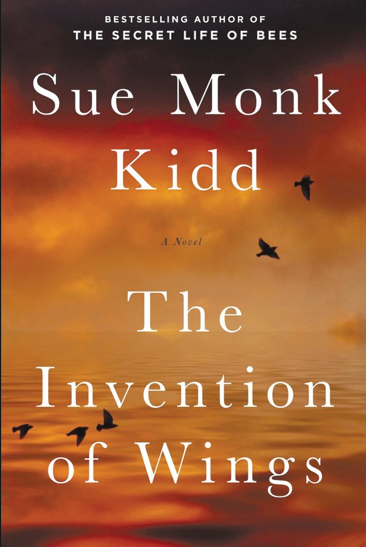
It is less than 200 years ago that slavery was a fixture in this country. As part of the curriculum in American schools we learn about this horrific treatment of human beings in the South and how the North tolerated this institution until the Emancipation Proclamation and ultimately the Civil War. However, I wonder if each succeeding generation of Americans really understands and appreciates what it was like to be enslaved in America and how this was accepted as part of everyday life by so many of the white people? When the award winning movie Twelve Years a Slave was released, there were some people who were disturbed by it because they felt it was too “painful to watch.” We are fortunate that there are filmmakers and in this case an author who can find a creative approach, to not only tell the story of slavery in the United States, but to do it a way that we not only understand what went on but that we can also have some idea of how the victims of slavery felt. I will say that this empathic experience for the most part extends to the oppressed rather than to understand the mindset of so many people who accepted this institution without question.
In this book we mostly follow two women for most of their lives. One is Sarah Grimke, born into a wealthy Charleston family at the beginning of the 19th century. Her father was a prominent judge, her mother was a socialite, her brothers were destined to be prominent lawyers and she and her sisters were expected to follow in her mother’s footsteps. Slavery was a way of life and there were 15- or so “Negroes” living in their house, each of whom had various duties. When there were children of the slaves, they would be brought up to follow in their parent’s footsteps. In fact, one such young girl was Hetty Handful who was presented to Sarah as a present for her 11th birthday to be her personal “slave.” Sarah rejects this plan, as much as a girl her age can reject the rules and the plan of the family. She secretly begins to teach Hetty to read which is forbidden. We meet Sarah’s father, the patriarch of the family and we see his acceptance of slavery with barely a reservation as well as his clear ideas about the limited role of women. We meet Charlotte, Hetty’s mom and a most skillful seamstress but a woman who knows where she came from and what she will never accept.
The reader becomes a fly on the wall in this household for the next several years as these girls grow up. We come to know the other members of this household, both slave and non-slave. We learn about the courting tradition, as Sarah and her sisters are formally allowed meet men at the proper time. The reader is introduced to how the slaves are punished when they make mistakes which can be a whipping or even worse (and the latter is described in vivid detail). Sarah develops a very close relationship with one of her younger sisters Nina, as at her own requests she is granted the role of godmother to her. Not surprising, their social values are quite similar and we are able to follow their fascinating paths, as both become prominent abolitionists. As in any good novel there are various sub stories. While the chapters alternate between “ Sarah “ and “ Hetty,” the fate of Charlotte, Hetty’s mother and Nina, Sarah’s special sister, inform the latter part of the book. As the story progresses, it also becomes clear that this not only a story about slavery in the United States but it is also about the beginning of the fight of woman to achieve equality in this country.
In fact, I don’t believe that it will spoil your enjoyment of this compelling novel, if I reveal what the author has put in a note at the conclusion of the book. That is that Sarah Grimke and her sister Nina Grimke were real people. They both became prominent abolitionists as well as advocates for women’s rights despite some concerns by supporters who believed that such rallying might dilute the difficult fight against slavery. While the dialogue, many subplots and storylines were the author’s imagination, other events and even some quotes were taken from some writings, biographies and historical reports which therefore confirms the feel of this story, which is one of authenticity. It is a book that captivates and holds you until the last line!
Comment » | FG - Fiction General, FH - Fiction Historical
August 8th, 2014 — 4:47pm
 Southland by Nina Revoyr– Having recently read and reviewed a great book mostly about social justice in Los Angeles ( see previously reviewed book in this blog) which included some insight into the history of racial conflicts and violence in this city, I was very receptive to picking up this novel. In fact, it did deal with these subjects with a compelling storyline which focused on the struggles of Japanese-Americans including their relationships with African Americans in Los Angeles over the past 50 plus years.
Southland by Nina Revoyr– Having recently read and reviewed a great book mostly about social justice in Los Angeles ( see previously reviewed book in this blog) which included some insight into the history of racial conflicts and violence in this city, I was very receptive to picking up this novel. In fact, it did deal with these subjects with a compelling storyline which focused on the struggles of Japanese-Americans including their relationships with African Americans in Los Angeles over the past 50 plus years.
The opening setting is the 1990s and Jackie Ishida is a Japanese-American young woman, preparing to enter law school and who also happens to be a lesbian whose grandfather Frank Sakari suddenly passes away. She comes into possession of a forgotten old box in his closet, that had a few clippings, some pictures and a great deal of cash with a note that it should be given to Curtis, a young teenager who worked in his old grocery store that was destroyed in Watts riots. It is well known to the family that those difficult times were very traumatic for many people including Frank not only because of the destruction brought about by riots but because in midst of them, Curtis and 3 younger boys were found locked in the grocery store freezer, having frozen to death. It was thought by some that this murder was the work of an unpopular white police officer who was known for mistreating kids in the neighborhood and was reportedly seen talking to them at the store on day of the tragedy. Jackie is moved to try to find more details. She connects with James Lanier, an African American who was Curtis’cousin. Once she talks to him, they team up to try to find out what really happened, in order to try to bring about some kind of long delayed justice. They embark upon a road trip (mostly limited to the Los Angeles area) where they interview several people who could shed light on this dastardly crime.
As the author follows this duo, she also provides flashbacks to earlier times to allow us to understand not only the characters in some depth but also the social climate of Southland, American, also known as Los Angeles. This includes the history of the Japanese who settled in this area and were sent to internment camps during World War II. We also learn about those young men who enlisted and fought in the War including some of the famed accomplishments of the Japanese American 442 regiment. The story that Jackie and James uncover is more than a study of how race relations played out during the past 50 years but it is also is a very personal moving story about her grandfather. She also finds meaningful insight into herself.
This 2003 novel deservedly won several awards. However, it did not hold me on edge of my seat or qualify as a page turner despite it being a great example of a “cold case being brought to life.” Some of the flashbacks, while necessary for insight into the characters, did seem to slow the flow of the book. A good part of the theme of this book also qualifies as an example of the search for biological roots which I have found in many true life clinical cases as well as a major storyline numerous motion pictures. See my blog about this subject.
Comment » | FG - Fiction General, FH - Fiction Historical, FM - Fiction Mystery
June 10th, 2014 — 6:52pm
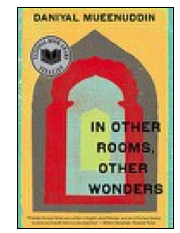 In Other Rooms, Other Wonders by Daniyal Mueenuddin – This is a book of several vignettes all taking place in Pakistan, not that long ago. It is about a place where there are modern feudal landowners and many poor people who work for them as servants, maids, sweepers, gardeners and other misc jobs. Some of the landowners are richer than others but no matter what class you are, you live your life with trials and tribulations. There is corruption everyplace. Everybody can be bought. The poor are essentially slaves to the upper class for whom they work. It is possible to get some reprise with sexual favors to the higher ups/ There is no real justice as people favor their families or people who pay them off. Stealing and lying are very common.
In Other Rooms, Other Wonders by Daniyal Mueenuddin – This is a book of several vignettes all taking place in Pakistan, not that long ago. It is about a place where there are modern feudal landowners and many poor people who work for them as servants, maids, sweepers, gardeners and other misc jobs. Some of the landowners are richer than others but no matter what class you are, you live your life with trials and tribulations. There is corruption everyplace. Everybody can be bought. The poor are essentially slaves to the upper class for whom they work. It is possible to get some reprise with sexual favors to the higher ups/ There is no real justice as people favor their families or people who pay them off. Stealing and lying are very common.
In one story a servant girl has a relationship with the master of the house. He dies and the estranged family and the wife and children send her away. In another story a young man from Pakistan goes to college and meets and American girl. They meet his family and his mother thinks that she will never really make her so happy. She isn’t sure either. Another story tells about relationship where a promiscuous young woman is about to settle down with a stable young man whom she believes she really loves but the relationship deteriorates. We meet a poor man who barely subsists with a portable shack and has the most menial job for a great feudal lord. He improves his lot a little by the generosity of a member of the owner’s family.
He finally marries a feeble minded woman and thinks he might have the semblance of family and maybe a child. He ends up with neither as she runs away. He is initially accused of kidnapping her and is beaten by the police. Eventually he returns home. His wife never returns and he dies a sad man.
What can possibly be the point of these stories? Certainly it is to tell us about the essential state of slavery that has existed in Pakistan for many years. Even the good deeds by a few people at times is not shown to be consistent with any real desire of those in power to change things. Certainly those without power are shown to have very little desire or ability to change the status quo. Not being very familiar with the history of Pakistan I can only hope that there has been some radical revolutionary changes there but I suspect neither.
It would be foolish to think that some unfairness only exists in Pakistan We know the history of this country about slavery and the remnants of discrimination that still exists. Despite a growing middle class we witness the lower class struggle in this country especially those who hold the poorest jobs often immigrants. So we can accept this book as more than a story about Pakistan but it still a stretch to feel that this is much of a contemporary tale of our society. It is hard to identify with the characters in these stories and overall it is a sad, depressing book which hopefully will help to keeps alive our empathic ability to change the world and establish basic fairness to all the inhabitants of this planet.
Comment » | FG - Fiction General
May 27th, 2014 — 5:13pm
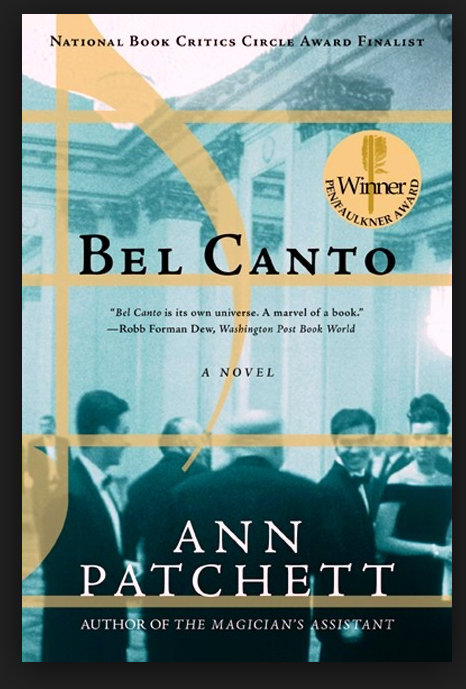 Bel Canto by Ann Pachett– Are there circumstances where a person could fall in love with someone new although he was perfectly well connected and content previously? Could an entire group of people come to love beautifully sung opera although they hadn’t been previously been exposed to it before or if they had, they hadn’t been moved by it? Could a group of people dedicated to a political cause give up their dedication and wish to lead another completely different life style in a relatively short period time? These are some of the questions that gradually emerge as we follow the lives of a group of terrorists and their hostages over several weeks. The setting is a third world country where a birthday party was being held for a prominent Japanese industrialist by the government officials who hoped that he and other well heeled guests might be favorably inclined to bring business to this country. Since the guest of honor loves opera, a very famous female opera star is imported to perform in his honor at the party. The guests also include diplomats from other countries so several languages are spoken at this affair.
Bel Canto by Ann Pachett– Are there circumstances where a person could fall in love with someone new although he was perfectly well connected and content previously? Could an entire group of people come to love beautifully sung opera although they hadn’t been previously been exposed to it before or if they had, they hadn’t been moved by it? Could a group of people dedicated to a political cause give up their dedication and wish to lead another completely different life style in a relatively short period time? These are some of the questions that gradually emerge as we follow the lives of a group of terrorists and their hostages over several weeks. The setting is a third world country where a birthday party was being held for a prominent Japanese industrialist by the government officials who hoped that he and other well heeled guests might be favorably inclined to bring business to this country. Since the guest of honor loves opera, a very famous female opera star is imported to perform in his honor at the party. The guests also include diplomats from other countries so several languages are spoken at this affair.
Suddenly through the airshafts emerge a group of young terrorists, with their guns led by three generals who hope to capture and take away the President of the country and hold him hostage with the hope of freeing prisoners whom they feel are unjustly in jail. Unfortunately for them only the host Vice President was among the guests and the terrorists were not quick enough to escape. The situation becomes a standoff with the hostages and their captors living together in the large vice presidential mansion behind a large wall with a Red Cross mediator bringing them food and ferrying back and forth the fruitless demands of both sides. The women and ill ones among the hostages with the exception of the opera star were released. Among the captors there were two young women who initially were originally thought by the hostages to be men. Everyone falls into a routine, which includes opera singing every morning. Most of the translations are done by one man, who was the assistant to the Japanese industrialist. The book may be based on an event that happened at the home of the Japanese ambassador to Peru in 1996 but the issues here are clearly the imagination and the story that Ms. Patchett has chosen to tell. What emerges is a study of human relationships and the power of the human voice when it is expressing emotion through singing opera and how these two important parts of life can be connected. The novel has some twists and turns and is a beautiful well written story.
Comment » | FG - Fiction General
 This is a road story about three plus one unlikely characters. There is Jess, a 20-something single mom, her maybe 12-year-old daughter, Tanzie and her teenage misfit stepson who was recently bullied. The plus one is Ed, a mid-30’s guy who Jess met when she cleaned his house in her job as a house cleaner and also drove him home one evening from the pub, where she works in the evening, after he drank too much. Tanzie is a math wizard who has the opportunity to win a scholarship plus expenses if she does well in the Math Olympiad in Scotland (They all live in England). Ed who is usually called Mr. Nicholls offers to drive Jess and family to Scotland after he sees them on the road when their car broke down on the way there. There is also a large droopy dog, Norman, who is along on this road trip so it is really three plus one plus one.
This is a road story about three plus one unlikely characters. There is Jess, a 20-something single mom, her maybe 12-year-old daughter, Tanzie and her teenage misfit stepson who was recently bullied. The plus one is Ed, a mid-30’s guy who Jess met when she cleaned his house in her job as a house cleaner and also drove him home one evening from the pub, where she works in the evening, after he drank too much. Tanzie is a math wizard who has the opportunity to win a scholarship plus expenses if she does well in the Math Olympiad in Scotland (They all live in England). Ed who is usually called Mr. Nicholls offers to drive Jess and family to Scotland after he sees them on the road when their car broke down on the way there. There is also a large droopy dog, Norman, who is along on this road trip so it is really three plus one plus one.

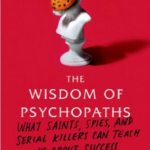


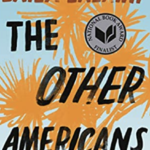

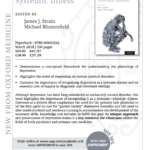

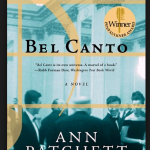
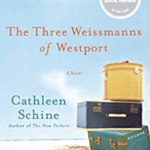










 In Other Rooms, Other Wonders by Daniyal Mueenuddin – This is a book of several vignettes all taking place in Pakistan, not that long ago. It is about a place where there are modern feudal landowners and many poor people who work for them as servants, maids, sweepers, gardeners and other misc jobs. Some of the landowners are richer than others but no matter what class you are, you live your life with trials and tribulations. There is corruption everyplace. Everybody can be bought. The poor are essentially slaves to the upper class for whom they work. It is possible to get some reprise with sexual favors to the higher ups/ There is no real justice as people favor their families or people who pay them off. Stealing and lying are very common.
In Other Rooms, Other Wonders by Daniyal Mueenuddin – This is a book of several vignettes all taking place in Pakistan, not that long ago. It is about a place where there are modern feudal landowners and many poor people who work for them as servants, maids, sweepers, gardeners and other misc jobs. Some of the landowners are richer than others but no matter what class you are, you live your life with trials and tribulations. There is corruption everyplace. Everybody can be bought. The poor are essentially slaves to the upper class for whom they work. It is possible to get some reprise with sexual favors to the higher ups/ There is no real justice as people favor their families or people who pay them off. Stealing and lying are very common.